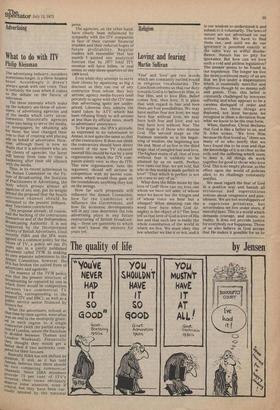Advertising
What to do with ITV
Philip Kleinman
The advertising industry, outsiders sometimes forget, is a three-headed beast. Accordingly it doesn't always speak with one voice. That is certainly the case when it comes to the debate on the future of television.
The three interests which make Up the industry are those of adver tisers, of advertising agencies and
Of the media which carry advertisements. Historically agencies
came into being to serve the media, i.e. newspapers, by obtaining ads for them, but later changed their role to that of creating and placing
ads on behalf of advertisers. However, although there is now no
doubt that it is advertisers who are the clients of agencies, the latter Still betray from time to time a hankering after their old alliance With the media.
Thus, in its recent submission to the Annan Committee on the Fu ture of Broadcasting, the Institute of Practitioners in Advertising, the body which groups almost all agencies of any size, put its weight • behind the proposal that the fourth television channel should be entrusted to the present Independent Television contractors.
This proposal already, of course, had the backing of the contractors themselves and of the Independent Broadcasting Authority. It is not supported by the Incorporated Society of British Advertisers. Until recently ISBA and the IPA were agreed on a common policy for the future of TV, a policy set out 21/2 Years ago in a jointly published document called TV76. In making Its own separate submission to the Annan Committee, however, the IPA has broken the united front of advertisers and agencies. The essence of the TV76 policy Was that the present structure of broadcasting be replaced by one in Which there would be competition between two commercial TV networks, corresponding to the Present ITV and BBC1, as well as a public service sector financed by licence fee.
What the advertisers, echoed at that time by their agents, were after Was an end to the monopoly granted in each region to a single contractor (with the partial exception of London, where the franchise 's divided between Thames and London Weekend). Financially they thought they would get a better deal if two networks competed for their favours. Basically ISBA has not shifted its Position. It still, as it has told Annan, believes that there should oe two competing commercial channels. Since ISBA members provide 75 per cent of ITV's lievenue, their views obviously' aeserve some attention, even if critical, but they have been curi°11sly ignored by the national
press. The agencies, on the other hand, have clearly been influenced by sympathy with the ITV companies in face of their current financial troubles and their reduced hopes of future profitability. Regular readers will remember that last month I quoted one analytical forecast that by 1977 total ITV revenue will have fallen, in real terms, to only three-quarters of the 1969 level.
Even while they attempt to serve their clients by squeezing as big a discount as they can out of any contractor from whom they buy airtime, agency media-buyers tend privately to agree with the ITV men that advertising spots are underpriced. Likewise they admire the stand taken by ATV which has been refusing firmly to sell airtime at less than its official rates, much to advertisers' annoyance.
To be precise, the IPA's attitude, as expressed in its submission to Annan, is not quite the same as that of the contractors. It does not think the contractors should have direct control of the new TV channel. Instead this should be run by a new organisation which the ITV companies jointly own, as they do ITN. This new organisation, runs the argument, should sell airtime in competition with its parent companies, which would thus gain on the roundabouts anything they lost on the swings. How far such proposals will influence the Annan Committee, how far the Committee will influence the Government, and how far economic developments will in any case determine the role advertising plays in any future restructuring of British broadcasting — these are questions to which we won't know the answers for years yet.


































 Previous page
Previous page